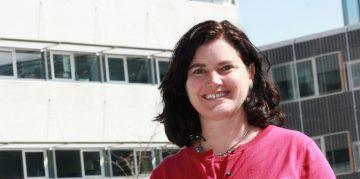February 21 2018
Faculty member Leila Harris and previous IRES Postdoc Crystal Tremblay published a new article.
Click on the link to read the full article: https://authors.elsevier.com/c/1WaOP3pILM2z4
This URL has a 50 day free access to the article. Until April 8 2018 this link will be taken directly to the final version of the article on ScienceDirect.
Tremblay, C. and L. Harris (2018). “Critical video engagements: Empathy, subjectivity and changing narratives of water resources through participatory video.” Geoforum 90: 174–182.
|
|
|
This article engages a critical feminist analysis of a community-based participatory video (PV) process focused on water and sanitation issues in underserved settlements of Accra, Ghana and Cape Town, South Africa. With focus on emotions and empathy, we highlight these concepts in relation to participant narratives and shifting subjectivities. In so doing, we consider how arts based engagement (in this case, through participatory video), might serve to foster new ways of relating to water resources and water infrastructures. The analysis highlights how the participants themselves reflect on PV as a vehicle for personal transformation, knowledge co-creation and a shifting sense of their own ‘watered’ subjectivity. We find that the PV process helps to uncover and identify knowledge and process gaps on by enabling individuals and communities—often unheard—to participate in civic and political debates around resource governance. While many positive elements were emphasized, we also suggest that there is a need for critical engagements that also address challenges associated with these methods, including limitations with respect to fostering fundamental long-term change in communities. In the conclusion, we broaden beyond our individual case studies to consider implications for community engagement and citizenship practices in the realm of natural resource governance.

Leila Harris
Associate Professor, IRES
Associate Professor, Institute for Gender, Race, Sexuality and Social Justice
Bio
Leila Harris is an Associate Professor at IRES Institute on Resources Environment and Sustainability and in the Institute for Gender, Race, Sexuality and Social Justice at the University of British Columbia. She also serves as Co-Director for UBC’s Program on Water Governance (www.watergovernance.ca), is a member of the EDGES research collaborative (Environment and Development: Gender, Equity, and Sustainability Perspectives, www.edges.ubc.ca), and is an Associate of the Department of Geography, and the Peter Wall Institute for Advanced Studies at UBC. Dr. Harris’s work examines social, cultural, political-economic, institutional and equity dimensions of environmental and resource issues. Her current research focuses on the intersection of environmental issues and inequality / social difference, water governance shifts (e.g. marketization, participatory governance), in addition to a range of water governance challenges important for the Canadian context (e.g. First Nations water governance). Current projects include a SSHRC funded project on everyday access and governance of water in underserved areas of Cape Town, South Africa and Accra, Ghana. Dr. Harris is also principal investigator for the SSHRC funded International WaTERS Research and Training Network focused on water governance, equity and resilience in the global South (www.international-waters.org).
For more on Leila: https://ires.ubc.ca/person/leila-harris/